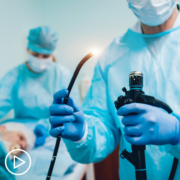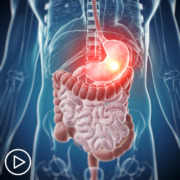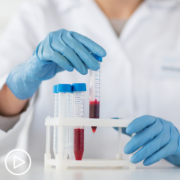How Does Gastric Cancer Screening Differ for High-Risk Groups?
How Does Gastric Cancer Screening Differ for High-Risk Groups? from Patient Empowerment Network on Vimeo.
Is gastric cancer screening different for some high-risk groups? Expert Dr. Jun Gong from Cedar-Sinai Medical Center shares how screening guidelines are evolving for some high-risk patient groups and advice to patients to ensure essential screening occurs.
[ACT]IVATION Tip
“…understanding whether you are in a specific high-risk subgroup it’s important to ask, whether diet and lifestyle can contribute to these risk factors are important to ask, and whether there is a risk of familial or hereditary causes of stomach cancer is important to ask as well. For us as oncologists to guide you to our supportive services and down the right path to address all of these concerns.”
Download Resource Guide | Descargar guía de recursos
See More from [ACT]IVATED Gastric Cancer
Related Resources:

|

|

|
Transcript:
Lisa:
Are there any screening tests that are recommended for anyone who might be in a group that’s known to have a higher incidence of gastric cancer?
Dr. Jun Gong:
Screening for stomach cancer in the U.S. is very evolving. It’s somewhat controversial. Unlike in East Asia and parts of the world where they’ve actually implemented standard endoscopic screening protocols as young as 40 or age 50. Here in the U.S., there hasn’t been any formal screening guidelines implemented for stomach cancer.
However, a lot of consensus groups recognize the high-risk subgroups of stomach cancer and in these risk factor, high-risk factor groups, especially if you have a family member a first-degree family member with stomach cancer or you’re a part of one of these ethnic groups that are at high risk, they do encourage screening to be discussed with your provider. And this can entail endoscopy surveillance as well.
So my activation tip regarding risk factors is to always inquire whether from your provider or from ancillary staff. It’s very common for us to refer our patients as well to cancer nutritionists, dieticians as well, in addition to going over what may be some possible familial or hereditary risk, if we sense that a strong family history is present.
And this is where referrals to genetic counselors are available. But understanding whether you are in a specific high-risk subgroup it’s important to ask, whether diet and lifestyle can contribute to these risk factors are important to ask, and whether there is a risk of familial or hereditary causes of stomach cancer is important to ask as well. For us as oncologists to guide you to our supportive services and down the right path to address all of these concerns.







![[ACT]IVATED Program Logo [ACT]IVATED Program Logo](https://powerfulpatients.org/wp-content/uploads/Program-page-image-option-1-180x180.png)


